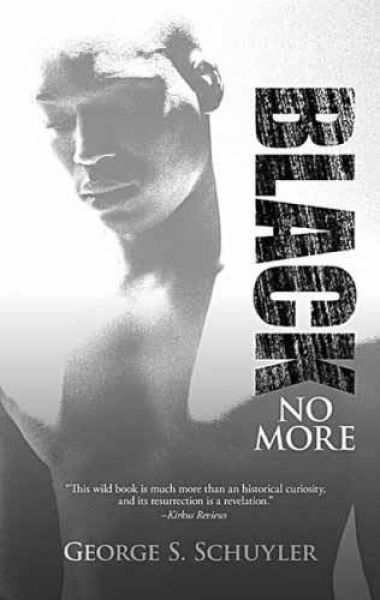A Whiter Shade of Pale
Black No More: Being an Account of the Strange and Wonderful Workings of Science in the Land of the Free, AD 1933 – 1940
By George S. Schuyler

18 Feb, 2018
George S. Schuyler’s 1931 Black No More: Being an Account of the Strange and Wonderful Workings of Science in the Land of the Free, AD 1933 – 1940 is a satire.
Where other inventors have offered temporary hair straightening and skin-lightening methods, Dr. Crookman provides a service that is both thorough and permanent: any American Negro with fifty dollars can walk into one of Crookman’s sanatoria and emerge indistinguishable from the white majority.
The consequences are not long delayed.
Fifty dollars (about $800 in modern US funds) is enough to cover Crookman’s costs while being within the reach of a considerable number of highly motivated African-Americans. Crookman and his companions soon become very, very rich, while America’s black population becomes increasingly white1. Once Crookman’s operation reaches sufficient size, he will be able to drop the price by half. He is not worried that he will run out of black people to whom he can sell his services; after he whitewashes America, he can start on sub-Saharan Africa and the African diaspora.
While the new state of affairs pleases his customers, it alarms those whose livings depend on America’s racial divide. This is true of black leaders who depend on a perpetual state of tension with the white majority. This is also true of white racists: their sense of self-worth depends on a group of dark skinned folk they can despise. Those who depend on racism for their income (bosses who hire cheap black labor, landlords renting expensive sub-standard housing to a captive market) will see their incomes decrease.
Max Dishman is one of the first to embrace the process. Free to mix with whites and considerably smarter than most of his new friends, he applies his perspective on the Race Question to the problem of making a living. In short order, not only is he effectively commanding one of America’s pre-eminent white-power organizations, he has a pretty blonde wife.
The process is not perfect — for one thing, the children of converted blacks are still born with dark skin — but it’s reliable enough that the day is approaching when America’s African population will be indistinguishable from white. This presents America’s two major parties with the question of how to respond to this sudden sweeping change. The Republicans fumble towards grudging acceptance of the new state of affairs, but the Democratic Party, dependent on Dixiecrat votes, simply double down on the race question.
The election of 1934 will be one of the bitterest in American history.
~oOo~
If you feel you need more side-eying from young librarians, I recommend taking this book out from your local library. I am amused that not only does UW’s Dana Porter library still have a copy of this book, it seems to be the same copy I read forty years ago. I have used the cover off a recent edition because the hard cover UW provided has no cover art.
Schuyler was an African-American intellectual who migrated from youthful socialism to conservatism. Once the NAACP’s business manager, he ended up a member of the John Birch society. In 1931, he was still something of a leftist. Towards the end of his life, he appears to have become something of a pariah as well as a tragic figure; his daughter died in Vietnam and his wife committed suicide.
Whatever his political tendencies, Schuyler had a keen eye for human foibles as manifested in the American people of all races. Pretty much everyone in this book, whatever their pretensions re public service, has their eye out for their own good, as well as a prodigious ability to convince themselves whatever they want to be true must therefore be true. Faced with the choice between hard truths or comforting fiction, Americans choose the latter almost every time.
I suspect that if the Schuyler of 1931 were transported to 2018, he would have absolutely no problem wrapping his mind around “fake news,” bombastic presidents, and a party dedicated to doubling down on the race question. He might be a bit surprised to discover that it was the Republicans playing the white power card so forcefully, but I imagine he’d quickly understand the implications of the Southern Strategy.
Schuyler also understood that one should never ask a question in public unless you already know the answer and know if you can live with it. This is not true of the Democratic Party of 1934, who, if elected, will enforce a strict genealogical division of Americans into black and white. It’s only once they are committed to this policy that they discover that Americans of all appearances and classes have African ancestry. Including most high ranking Democrats. Oops.
It may not be obvious from the above, but this book is a comedy. It’s often a very bleak comedy, long on “what fools these mortals be,” but still, it’s often funny. There are moments when people somehow manage to overcome their baser instincts — Dishman, faced with the problem of explaining to his white spouse why their baby is black, eventually decides tell his wife the truth rather than exploiting her conviction she must secretly be black — but generally they don’t. Strangely enough, despite being shallow, greedy, and foolish, Schuyler’s Americans somehow fumble their way towards a happy ending. Just not one they could have foreseen before Crookman’s process appeared.
Black No More is available here (Amazon) and here (Chapters-Indigo).
1: Even before Crookman’s process, African-Americans embraced colorism; paler African-Americans ranked higher than dark skinned African-Americans. As soon as the process appears, converted African-Americans embrace white values and snub their unconverted former friends. This ploy carries its own punishment, as the whites of the 1930s are frequently awkward, rude, wilfully, proudly ignorant, and more boring than African-Americans.
